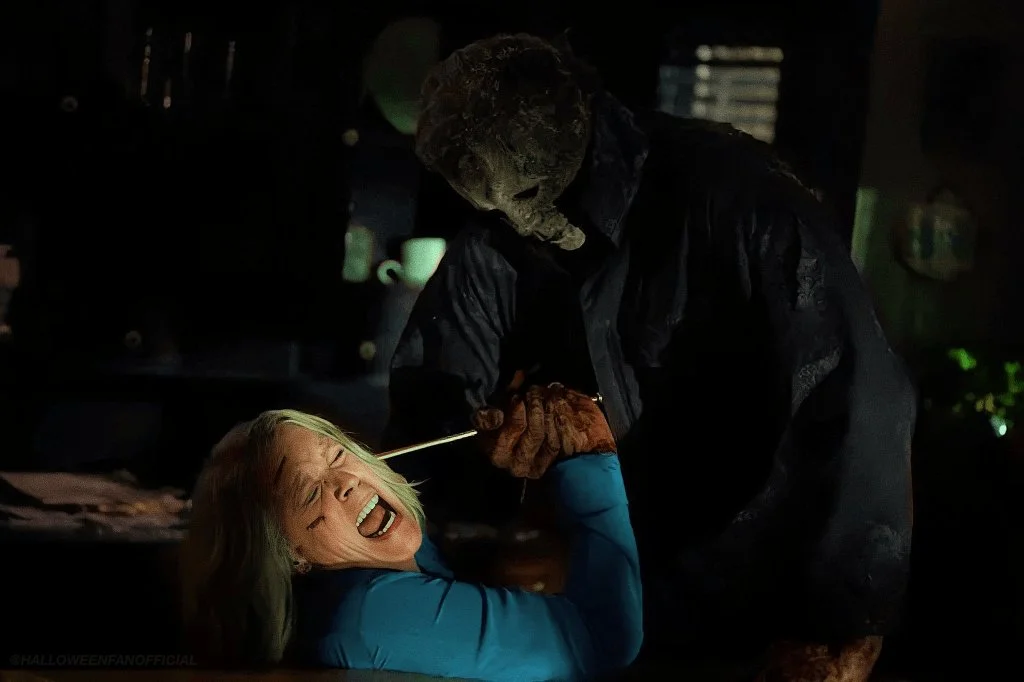Not a treat but rather a trick on the audience, Halloween Ends, the purported concluding chapter of the enduring four decade slasher franchise, is an interminable misfire so off the mark that one wonders how writer-director David Gordon Green and co-writer Danny McBride were given carte blanche by horror outfit Blumhouse to craft a picture with little more than a passing resembling to the series, and genre, to which it belongs. Have they even seen John Carpenter’s original? Certainly they have, because they paid effective homage to that classic in the opening sequence of their last picture, Halloween Kills, which was moderately effective, albeit silly in the extreme. How much lower could Green, McBride, Michael Myers and venerable Laurie Strode (Jamie Lee Curtis) go? As it turns out, the realm seems bottomless.
Michael Myers, that enduring boogeyman and pop culture icon of horror—introduced by an influential young John Carpenter in his watershed and unsurpassed 1978 masterwork, still the last word in slasher films—who has been stabbed, burned, shot and mutilated multiple times on each front, offers little more than a cameo in Halloween Ends, the third in a “trilogy” that began with 2018’s disappointing reboot Halloween, an assembly line stalk-and-slasher with little distinction. 2021 saw Halloween Kills, which sidelined Jamie Lee Curtis’ prototypical final girl Laurie Strode while the good citizens of Haddonfield hunted their homegrown phantom with a mob rule mentality before declaring, in no uncertain terms, that evil was indeed indestructible.
The final installment wants to be about everything but the requisite stalk-and-slash, and in doing so becomes, bloatedly, about nothing very compelling. This time, Green opens with an admittedly effective sequence set on Halloween night in 2019 involving a teen babysitter (nodding to Carpenter’s original) named Corey (Rohan Campbell), whose charge is killed in a tragic accident. While he’s acquitted of murder, Corey becomes the town outcast and object of vicious persecution.
Meanwhile, Laurie Strode has purchased a new house and appears on to a fresh start after the murder of her daughter (Judy Greer, missed) in the last installment. Laurie has settled down with granddaughter and nurse Allyson (Andi Matichak), whom she dotes upon while crafting a book about evil and survivor’s trauma. Like Corey, Strode is also a Haddonfield black sheep, accused by the town folk of instigating Myers, leading to scores of murders. There is an interesting early symmetry between Laurie and Corey, and in one solid scene she protects him from the local bullies.
Things soon go from bad to worse for Corey, the public abuse continuing while he finds respite in a budding affair with Allyson. At the same time, he becomes a crucible for the flower of evil, inexplicably bonding with accursed Myers, who has been missing for a few years but now secretly lives in a drainage pipe, physically deteriorating in his age (he’d be 65 today). Corey, suffering the spoils of tormented social and home lives (including a bizarre, demonstrative mother wildly overacted by Joanne Baron) grows closer to Allyson. But it is his strengthening connection to Myers, as a willing protege, that consumes him, donning Michael’s mask for a killing spree all his own.
Laurie is smart enough to know evil when she sees it, so in a well-written scene she warns Corey to stay away from Allyson, attempting to ward off the darkness she initially mistook for put-upon angst. Finally, at about an hour and forty minutes into the picture, Green delivers what everyone came for, a final showdown between Laurie and (the real) Michael, inert in both imagination and execution—a ten-minute scene in a kitchen sans suspense but featuring, predictably, a fair amount of gore. What happens next betrays the central idea of an unstoppable, indestructible evil—which Halloween Kills argued for—ending the franchise a wholly different note.
Along the way, Will Patton reprises his turn as kindly Officer Hawkins, still pining for Laurie, and Kyle Richards returns as Lindsay Wallace character, a veteran of Carpenter’s original, given a mere one scene when she could have been more prominently featured (and paid good fan service), expected after her welcome return in Halloween Kills.
Delivering a conceptually misguided picture attempting to “do something different” or “elevate” the slasher saga, Green stuffs Halloween Ends with pat ruminations on evil and trauma, extended diversions into its tortured young adult love story, familiar notions on the legacies of small-town pariahs and dollops of John Carpenter’s Christine, all turning out to be dead ends in a movie franchise that is supposed to be about two things—elemental fears of a boogeyman and the dark. Instead, this overlong movie, with its absence of frights and inexplicable focus on “character-centric” drama (it takes a long 45 long minutes before Myers appears) that would have been better served in a different context, wastes its sharp as ever star Curtis (trying to do something substantive) along with our time and patience.
The problem isn’t Green and McBride’s ambition to “say something” in the context of the genre. Effective, thinking horror and sci-fi films have always explored social anxieties and served as cultural barometers on their given moments, from Dr. Jekyll and Mr. Hyde to The Day the Earth Stood Still to Invasion of the Body Snatchers to The Stepford Wives to Rosemary’s Baby to The Exorcist to Get Out. And for a film about the link between trauma and the manifestation of evil, Jennifer Kent’s superb The Babadook is definitive.
But Halloween Ends goes too far afield and fails to effectively integrate its messages about evil and trauma into its series parameters. Most of all, it fails to take a franchise that has existed for forty-four years to any sort of worthwhile closure.
1 1/2 stars.



